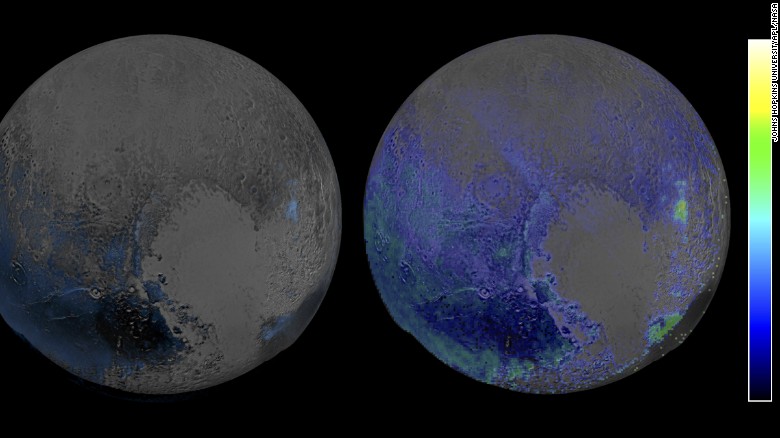
The dwarf planet is way icier than scientists originally thought.
Source: Pluto is covered with a lot of water ice – CNN.com
Pluto has way more frozen water than scientists originally thought.
The dwarf planet is coated with a large amount of ice,according to a new map using previously collected data from NASA’s New Horizons spacecraft.
This map is more sensitive than an earlier version that was created using data by New Horizons’ historic fly by in 2015. The previous map was at a disadvantage because water ice can be easily masked by frozen methane. So it only showed areas with an especially large amount of frozen water.
A new method, which involved NASA stitching together two infrared images captured by New Horizons’ Ralph/Linear Etalon Imaging Spectral Array (LEISA) instrument, at a distance of about 67,000 miles, allowed scientists to mute ice signatures created by other elements, such as methane and nitrogen, and heighten the signature for water ice. What they discovered was a lot of frozen water blanketing little Pluto’s surface.
So what’s the big deal? Didn’t we already know Pluto was like an Elsa paradise? The planet has towering ice mountains and two potential cryovolcanoes — yes, that means ice volcanoes. Well, this new map shows water ice is more widespread across Pluto’s surface, which is an important discovery, according to NASA officials.
Ice, snow, glaciers — Earth teems with water ice. Water ice is Pluto’s bedrock — the relatively hard, solid material beneath a world’s surface. Finding water on another world is important. It is considered one of the key ingredients to life as we know it. However, oxygen and hydrogen, the elements in water, are abundant in the universe. And water is just one piece of NASA’s search for a habitableplanet.
In fact, there are several worlds thought to have subsurface liquid water, and many with water in the form of ice or vapor.
According to the new map of Pluto, there’s little evidence of ice water in the Sputnik Planum, which lies in the western region of Pluto’s “heart,” and Lowell Regio, NASA officials said in a statement on Thursday. “This indicates that at least in these regions, Pluto’s icy bedrock is well hidden beneath a thick blanket of other ices such as methane, nitrogen and carbon monoxide,” according to the statement.
Since New Horizons fly by in July 2015, the dwarf planet has been full of surprises. Its icy surface, frozen water and mysterious moons have marveled scientists.
Meanwhile, New Horizons is on a new mission, millions of miles on the other side of the dwarf planet. The piano-sized spacecraft is chasing down a small object known as known as 2014 MU69, which lies a billion miles beyond Pluto in a rocky part of space known as the Kuiper Belt.

